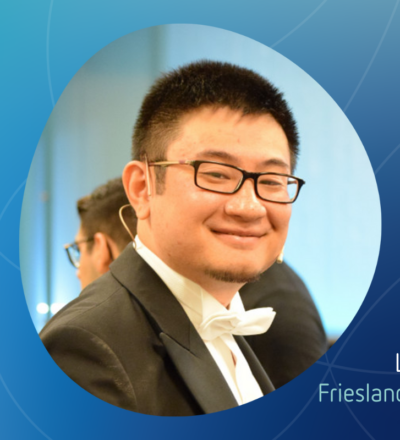Li Weiwei is a research specialist at FrieslandCampina, where he oversees research projects in the food-domain. Together with ISPT, FrieslandCampina is working on several technologies to help us save on valuable energy and work towards a zero carbon emission future. How? Li Weiwei tells us all about it in this interview.
Name: Li Weiwei
Position: Research specialist
Organization: FrieslandCampina
Works with ISPT on: Mild processing, drying and industrial fluid
Working with ISPT, means working with an organization that has similar goals and access to a very relevant group of experts.
Li Weiwei, FrieslandCampina
Why is it important to you to work on projects that support energy lowering in industry?
“FrieslandCampina is working towards a zero carbon emmission future through climate neutral production. That means we continue to strongly reduce our greenhouse gas emissions. We want to reduce CO2 consumption in our supply chain by 2030 by 63% from our new target (scope 1 and 2, baseyear 2015). No later than 2050, we want to achieve CO2-neutrality. That means we ban fossil energy sources and only use green energy. But it also means we strongly reduce our energy use. These projects fit within our sustainability ambition.”
According to you, what are the biggest problems that you and your company need to work in helping to lower the energy use of industry?
“As a company processing food, food quality and safety is a key priority. Much of our milk is processed to other dairy products. For our safety, quality and processing we often require a lot of heat. Reducing energy use and maybe switching to other energy sources, can ask for different ways of processing without reducing quality. But also, the installations we use are high investment multi-year installations. Reinventing processes or renovating machinery are time and cost intensive processes.’
What are the biggest opportunities for innovation in lowering energy use in industry?
“From financial point of view, current energy crisis provides an opportunity, because the new business case calculation will help convince our Supply Chain to adapt to more innovative technologies.
Considering a technology point of view, increase dry matter in liquid concentrate by membrane instead of thermal methods (evaporation), which also generates high quality permeate (e.g., reusable process water), is an opportunity. There are also interesting developments in novel technologies in drying, which we are closely monitoring. Preservation and membrane technology can also use less energy-intensive ones to replace current more energy-demanding ones. We are keeping a close eye on novel development in our key technologies and energy is one key criterium.
Additionally, we are using more and more heat pumps (use electricity as source for steam generation, so we can replace natural gas). MVR (mechanical vapor recompression) is being used in our SC (e.g., Leeuwarden have 3 new MVR in one go). RO in Lutjewinkle to concentrate cheese whey instead of evaporation, which leads to a natural gas reduction of 50% for that site. E-boiler feed by wind energy is in plan and has received subsidies. Heat integration between heat pump and cooling water has been installed in several locations.”
Can you tell us about your partnership with ISPT? How are you working together?
“At FrieslandCampina we have a set of goals for a sustainable future. For our production locations we want our processes to be climate neutral(energy) and circular where possible. The latter relates most to water, waste and packaging. Those are serious ambitions and therefore not easily achieved.
We believe that such goals can only be achieved when working together. Therefore, working with ISPT, an organization with similar goals and a very relevant group of experts, means we can truly make a zero carbon emission future happen. We are an active member of
- Mild Fractionation for Food. Where we focus on projects in novel process routes concerning low energy, water, chemical based, or plant based, ways to do so in a smart way.
- Drying, where we have 2 large projects funding and working with 4 PhDs in total
- Industrial fluid Processing. For example the DISCO project, where also a PDeng student works with us.
Where do you see your company in 2030?
“Then, we will have 63% lower carbon emissions compared to 2015. We will realize this (among others) through a strong reduction in energy use, increase in green energy use and hopefully sourcing 100% of our green power from our own farmers. Whereas, currently we use 100% green electricity of which 50% comes from our farmers. Furthermore:
- We have strongly reduced waste and have transformed more elements that are currently ‘waste’ into a valuable product that can be used again.
- As part of our total portfolio, our Plant-based product is also successful.
- We will create synergy and integration among all technologies into a more sustainable and low cost price.
- Use innovative technologies to achieve our 63% reduction by 2030. In the meantime, also reduce our water footprint as well.
- And of course, eventually a zero carbon emission future and a positive biodiversity impact.”
Our partners are of great value for our open innovation platform. In this series we proudly introduce some of them to you with a short interview about collaboration in the energy transition.
Acknowledgement
This project is co-funded by TKI-E&I with the supplementary grant 'TKI- Toeslag' for Topconsortia for Knowledge and Innovation (TKI’s) of the Ministry of Economic Affairs and Climate Policy.
